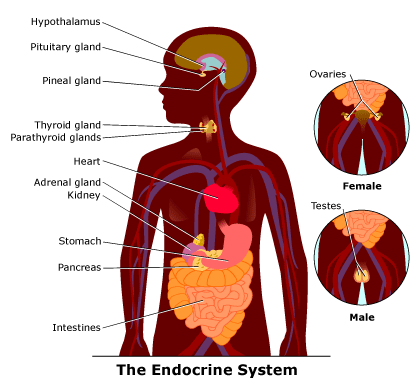
Trying to lose weight can seem like a daunting task! It's hard to know where to start, and can be hard to find a program that really does work and will give you the results you want!
What can be even more frustrating? Starting a plan only to find that you're not losing any weight. You're eating right and exercising often, and doing all you are supposed to. So why aren't you seeing any results? The problem maybe isn't with the program, but could be found in your body, specifically in the endocrine system.
The Endocrine System and Your Weight
Few really understand the endocrine system and the important role that hormones play in our lives. Understanding it better, and understanding YOUR body better, could be the key to get past this barrier and get on your way to the body of your dreams!
What is the Endocrine System?
The endocrine system is a complex network of nine glands and over 100 hormones in our body. It is made up of the thyroid gland, adrenal glands, pituitary gland, parathyroid glands, the pancreas, the ovaries in females, and testicles in males. And actually influences almost every organ, cell, and function of our bodies. It regulates activities from reproduction, metabolism and development to mood, energy and mental abilities.

Hormones are chemical messengers that transfer information to one set of cells to another. They move through the bloodstream, and each type of hormone has different specializations.
Glands are groups of cells that give off chemicals. A gland will remove materials from the blood, process them, and then secrete the finished product for use at a location in the body.
Disorders of the Endocrine System
Most endocrine disorders are caused by a heightened or diminished level of particular hormones. These diseases are also caused when our bodies do not respond to hormones correctly.
Let's take a look at some diseases of the endocrine system, to find a relationship between weight gain and the endocrine system.
Diabetes
This is the most common endocrine disorder in the US. Here our bodies don't properly process glucose. And can be caused by a lack of insulin or if our bodies are not functioning properly.
Thyroid disorders are more common in those with diabetes (especially Type 1). So it is especially important to get your thyroid hormone levels checked regularly, to help regulate your body.
Hypothyroidism
Here, your body lacks sufficient thyroid hormone. The thyroid hormone is primarily responsible for running your body's metabolism, so when you have hypothyroidism you experience symptoms that are related to a slow metabolism, and you will generally find yourself gaining weight.
Hypoglycemia
Hypoglycemia is also associated with low blood glucose levels. And is often the result of a side-effect of diabetes treatment, and can also result from other diseases or medications, tumors and hormone or enzyme deficiencies.
Iodine Deficiency
Iodine is needed for the production of the thyroid hormone. On its own, your body do not make enough iodine so it is an essential part of your diet. Lacking enough iodine in your body will make it so you cannot make enough thyroid hormone. This deficiency can lead to hypothyroidism and enlargement of the thyroid. And we know how hypothyroidism can lead to weight gain.
When someone is struggling to improve their metabolism's efficiency in order to lose weight, it is critical to look at hormones. If your hormones aren't converting food into energy efficiently, you can exercise and eat healthy without seeing the results you expect.
Hormones and Metabolism: Beyond Your Control?
An endocrine disorder isn't always at the root of weight problems. Metabolism is affected by lifestyle, activities, age, muscle tissue and genetics, as well as the endocrine system. If you're having trouble shedding excess fat, take a good look at all of the factors.
Are you really eating and exercising right? Look also at your stress level, sleep quality and mindset toward weight loss. Measure the results as you make positive changes to the areas that are within your control.
Some endocrine imbalances can be corrected with a balanced diet. Iodine deficiency, for example, can have a serious impact on a person's weight. For some, the solution is as simple as including more iodized salt in their diet and taking a multivitamin that includes iodine (check the label—only about half do).
Exercise is another great way to influence your metabolism. To metabolize food efficiently, you need to have an exercise regimen and also stay active throughout the day. Weight training, especially, will help you to be able to preserve muscle and when you increase your muscle, you boost your resting metabolic rate. Making it so even when at rest you will find that you are burning calories.
Living a healthy lifestyle, like regular physical activity and a healthy diet can help to reduce the risk of Type 2 diabetes, can help lower blood pressure and cholesterol levels and other illnesses.
If you believe that you may have a hormonal imbalance or an endocrine disorder, consider talking to an endocrinologist. These specialists understand the complex nature of hormones and can help you get the balance right, so you can achieve success with your fitness program.
What You Can Do
Understanding the root cause of your weight gain is important to being able to treat it. There are many underlying issues that could be to blame for unexpected weight gain, and in these instances healthy eating and exercise alone just won't cut it. Talking to your doctor before starting a fitness program is important to make sure that it is safe for you, and also to see if there are any other reasons you are struggling to lose this weight.
Now you know what you need to do but where are you going to start?
The start of a program can sometimes be the hardest part. That is why we have a Trial Box and a Kick Start Box. These boxes provide you with the products to get the ball rolling on your weight loss. This includes two pouches of our special Shake Mix and our weight loss drink, Boost. These products will propel your weight loss goals by the use of our effective appetite suppressant, Slendesta. We suggest you substitute 1 to 2 meals per day with one of our Shakes - this way you can be assured that you are getting all the essential vitamins and minerals needed to support a healthy weight loss.

Related Articles








